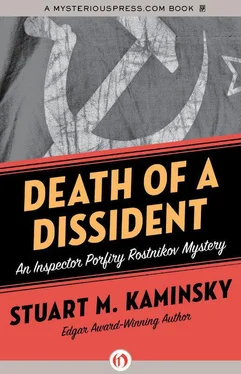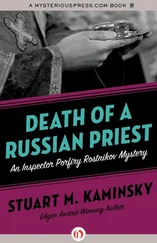Stuart Kaminsky - Death of a Dissident
Здесь есть возможность читать онлайн «Stuart Kaminsky - Death of a Dissident» весь текст электронной книги совершенно бесплатно (целиком полную версию без сокращений). В некоторых случаях можно слушать аудио, скачать через торрент в формате fb2 и присутствует краткое содержание. Год выпуска: 2012, ISBN: 2012, Жанр: Полицейский детектив, на английском языке. Описание произведения, (предисловие) а так же отзывы посетителей доступны на портале библиотеки ЛибКат.
- Название:Death of a Dissident
- Автор:
- Жанр:
- Год:2012
- ISBN:9781453266298
- Рейтинг книги:4 / 5. Голосов: 1
-
Избранное:Добавить в избранное
- Отзывы:
-
Ваша оценка:
- 80
- 1
- 2
- 3
- 4
- 5
Death of a Dissident: краткое содержание, описание и аннотация
Предлагаем к чтению аннотацию, описание, краткое содержание или предисловие (зависит от того, что написал сам автор книги «Death of a Dissident»). Если вы не нашли необходимую информацию о книге — напишите в комментариях, мы постараемся отыскать её.
Death of a Dissident — читать онлайн бесплатно полную книгу (весь текст) целиком
Ниже представлен текст книги, разбитый по страницам. Система сохранения места последней прочитанной страницы, позволяет с удобством читать онлайн бесплатно книгу «Death of a Dissident», без необходимости каждый раз заново искать на чём Вы остановились. Поставьте закладку, и сможете в любой момент перейти на страницу, на которой закончили чтение.
Интервал:
Закладка:
“Has he?” he asked.
“Of course,” said Timofeyeva impatiently. “You have his confession. He knew both victims, quarreled with them, tried to kill a policeman.”
“I think at some time this Vonovich has quarrelled with everyone in Moscow,” Rostnikov said, looking up. “I think this Vonovich did murder someone, but not recently and not Granovsky or the cabdriver.”
Procurator Timofeyeva looked at the pile of work on her desk and then at Rostnikov.
“Is that what you want me to tell the Procurator General, Porfiry Petrovich, that you haven’t caught the murderer?”
“It is not my position to tell you what to say, Comrade Procurator,” he answered.
“Porfiry,” she answered in a voice Rostnikov had never heard from her before, a voice with the timbre of emotion and something else. “There is so much to this. It is best that there be an end, that the murderer be this worthless enemy of the state, that the world know it was the deed of a drunken lout, a criminal. It is best.”
“As you say, comrade,” Rostnikov agreed rising.
“Go home, rest. You have a heavy caseload. Get back to it. I’ll take care of the report.”
“As you wish.”
“As I wish,” she repeated with words far away. “There is much to be done, Porfiry, and too few of us to do it. Even after all these years the old society is still disintegrating. As Lenin told us, this disintegration is manifest in an increase of crime, hooliganism, corruption, profiteering, and outrages of every kind. To put these down requires time and an iron hand.”
“Of course,” he said. Her hand reached out for the phone and she waited while he left and closed the door behind him.
Rostnikov picked up his coat in his office and went home. He could not justify a police car now so he took the bus and walked telling himself it was over but realizing that he could not accept this. Oh, he could accept it with his body and go on with his caseload. It would not be the first case that ended without a solution or with one that Rostnikov thought was wrong. No, this one would continue to bother him because if Vonovich were not the killer then the killer was still out there in one of the buildings he was passing or a hotel or walking the streets.
Rostnikov had difficulty accepting the priorities of his society. He recognized them, understood them, sympathized with them, but it was difficult. He had perhaps read too little Lenin and too much Dostoyevsky, or maybe too many of the American police stories that he had bought from Chernov the bookseller, the stories in which Ed McBain’s 87 Precinct Police always got their man or woman. If he ever got to America, Rostnikov wanted to meet Ed McBain, or at least visit the city of Isola.
Sarah had a pot of soup and a half loaf of black bread ready for him when he got home.
“It’s finished?” she asked.
He shrugged and looked over in the corner toward his beloved weights, but he was too tired. He should rise above his weariness and do some lifting, show his resolve.
“The hell with it,” he said instead with a huge glob of bread in his mouth.
“What?” asked Sarah.
“Nothing,” he said and reached for his plumbing book.
Anna Timofeyeva had a cat. It was one of the few things in her life about which she felt guilty, for she spent very little time with the animal. Home, except for the cat, was where Anna went because it was improper to sleep in her office.
“I hear, Bakunin,” she told the ancient grey fluff that waddled toward her as she took off her coat, “that in America they have special food for cats, special food. You go to the store and stand in line for cat food.”
In spite of her position, Anna Timofeyeva lived in a small one-room apartment in an old one-floor concrete building that had originally been built as a barracks for an artillery unit. When the site was abandoned after ground-to-air missiles were developed, the barracks along the Moscow River were converted into small apartments with a communal kitchen which had once served as the kitchen for the artillery unit stationed within its walls. Anna Timofeyeva felt comfortable in the small room. It required little cleaning, was conveniently located and quite practical.
It was somewhere around three in the morning, she knew, but she had no interest in checking the time. The important time was when she got up, not when she went to sleep. She had named the cat Bakunin, for the infamous anarchist who had opposed Marx, because she liked to think the cat was an adventurous troublemaker who had to be forgiven. Bakunin purred loudly and rubbed against her as she pulled a can of herring from her pocket. Bakunin was, in fact, a remarkably docile creature who, having been denied the opportunity to roam, became like a beast in a zoo, dependent on the one who feeds him and in a general state of physical torpor with occasional moments of undefined resentment.
“Patience, Baku, patience,” she said, finding her can opener and working on the herring. “We must learn patience.” And, she thought, above all we must learn to compromise.
Although she was hungry, Anna Timofeyeva knew that sleep was more important to her. She would not go down to the kitchen to cook something or even make some tea. Such an act would disturb the other tenants. Not that they would complain. They all deferred to Comrade Timofeyeva, who was a legend in the building, a legend seldom viewed but often discussed. That one of her high rank should live among a group of the relatively poor was most puzzling. The tenants vacillated between extreme suspicion and fear and pride, believing that somehow her presence provided those under the roof with a special protection.
She had lived in the building for more than twenty years, but Anna Timofeyeva was barely aware of the other tenants. She knew that at least one of the other six was a family with a small baby that occasionally awoke crying in the middle of the night.
After rubbing her eyes, Anna Timofeyeva allowed herself to move to her bed where she slowly pried at the can of herring with an old metal opener. The cat purred loudly, and Anna moved surely with thick, strong fingers.
“Allow me a taste,” she said dipping her fingers past the jagged edges of metal. “It passes inspection.” She put the can on the tile floor and leaned over to pet the cat as it ate.
“Bakunin,” she whispered. “Lenin said that to reject compromises ‘on principle,’ to reject the permissibility of compromises in general, no matter of what kind, is childishness, difficult even to consider seriously. Sometimes I think Rostnikov fails to understand the nature and need for compromise.”
Bakunin was working on a particularly unresponsive piece of fish which dangled from the corner of his mouth.
Anna Timofeyeva removed her uniform carefully, brushed it, and hung it on the high hook where Bakunin could not rub against it. There was no mirror in the room. Anna Timofeyeva was only interested in her image insofar as it displayed conviction and authority and that she could see in the window in the morning.
She changed her warm, practical woolen underwear and moved to the small basin in the corner to brush her teeth with salt and a calloused finger. Something tugged at her chest like a marionette master pulling all the strings at once, and then it passed. She breathed deeply, rinsed her mouth and retrieved one of the small pills that had been given her by the doctor at the Institute Sklefasofskala. The tightness slowly passed as the pill began to work.
“Bakunin,” she said softly. “I must straighten the room.” She moved slowly, putting what little there was to put in order in the right place and then she removed the note from her dresser drawer. It was a simple note that she had prepared three years before. It stated that if she were to be found dead, instructions for the continuance of her cases were in the top drawer of the desk in her office. Her instruction book was brought up-to-date each day before she came home to sleep. Her note asked that Bakunin be given to Rostnikov in the event of her death, but she had made no provisions for the eventuality of going to a hospital.
Читать дальшеИнтервал:
Закладка:
Похожие книги на «Death of a Dissident»
Представляем Вашему вниманию похожие книги на «Death of a Dissident» списком для выбора. Мы отобрали схожую по названию и смыслу литературу в надежде предоставить читателям больше вариантов отыскать новые, интересные, ещё непрочитанные произведения.
Обсуждение, отзывы о книге «Death of a Dissident» и просто собственные мнения читателей. Оставьте ваши комментарии, напишите, что Вы думаете о произведении, его смысле или главных героях. Укажите что конкретно понравилось, а что нет, и почему Вы так считаете.












